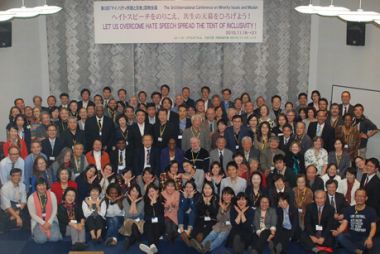Japan's churches: Our country needs to face up to its past

Japanese churches have called on their government to face up to their country's war record and introduce laws to "outlaw hate speech and other forms of discrimination".
In a statement issued from the International Conference on Minority Issues and Mission in Tokyo, the churches refer to entrenched racism in Japanese society.
The statement reads: "Hate speech that incites racial hatred and ethnic discrimination against Koreans in Japan and other minorities is being made in public places by organizations, which cause fear and pain by using discriminatory and exclusionary slogans, like 'maggot', 'cockroach', 'subhuman', 'die' or 'kill'".
The document also includes a powerful plea for Japan to come to terms with its wartime actions, of which many Japanese people are unaware. It reads: "It is clear that historical revisionism that tries to obliterate historical awareness of Japan's colonial rule, war and war responsibility, and of its victimizing past of violations against human dignity, serves to legitimize hate speech." The statement says that historical facts are "distorted and manipulated" in Japan and that Prime Minister Shinzo Abe is complicit in "historical revisionism".
Prime Ministers of Japan have been dogged by calls for a more thorough apology for its treatment of prisoners and its actions in China and Korea during the 1930s and 1940s. Little about the period is taught in Japanese schools.
"We believe that hosting this conference is one of the constructive ways for our church to respond to the call for mission given to us by God," said Rev Kim Byungho, general secretary of the Korean Christian Church in Japan (KCJJ), which hosted the conference.
"Many conflicts in today's world stem from the discriminative policies and actions toward minorities, and specifically in Japan there is growing concern around the increasing militarization of Japan which has yet to fully acknowledge its past crimes and make necessary actions to amend the wounds."
Byungho added: "We hope this conference will provide an opportunity for the churches in Japan and the world to share our common concerns and build bridges of solidarity so that minority communities in Japan can fully realize and enjoy the fullness of life as citizens with equal rights, and it is the desire of the KCCJ to contribute to this ultimate goal."











